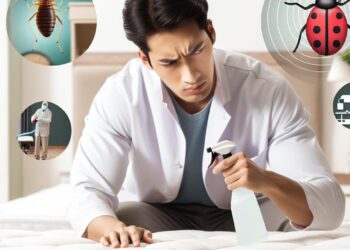When pesky pests invade our homes, tackling them with home remedies can be an appealing first line of defense. Using natural solutions to eliminate pests like bed bugs offers a pesticide-free alternative that can help protect both our health and the environment. However, understanding what these home remedies actually entail and their effective use is crucial. Not only can improper usage lead to ineffective pest control, but it can also impact your health or business premises. This blog will explore the common issues pests pose and arm you with practical, DIY prevention tips to help keep your home happy and bug-free.
Understanding Home Remedies for Eliminating Bed Pests and Pesticides
When we delve into “home remedies to eliminate bed pests,” it involves tackling nuisances like bed bugs without heavy-duty chemicals. These tiny pests, synonymous with discomfort, thrive in places where humans rest, such as mattresses and bed frames. But why are they such a pain? Mainly, because they’re adept at hiding and can multiply quickly if unchecked. Commonly found in bedrooms—especially within mattress seams, under baseboards, and behind wall hangings—they’re tricky to spot at first. They seek warmth and the carbon dioxide we emit at night. You might wonder, “What’s the give-away?” Typically, waking up to itchy, red bite marks in a line or cluster is a tell-tale sign. Furthermore, finding small, dark fecal spots on sheets or peculiar odors akin to spoiled raspberries signals their presence. Left untreated, they pose not just discomfort but potential allergic reactions and insomnia, making their early detection crucial.Understanding Common Issues with Home Remedies for Bed Bugs
Dealing with pests can be an absolute nuisance, and although home remedies might seem like a quick fix, they can sometimes cause more harm than good. Here’s a breakdown of common problems caused by using “home remedies to eliminate bed pesticides definition”:- Structural Damage: Some home remedies, if used excessively, might seep into wooden or structural surfaces leading to gradual degradation. You might find yourselves facing costly repairs before you even know it.
- Health Risks: While ingredients like essential oils or vinegar aren’t harmful in small doses, their concentrated forms may lead to respiratory issues or allergies, especially in young children or those with sensitive health.
- Food Contamination: If you’re applying remedies in your kitchen, there’s a risk of these solutions contaminating your food. This unintentional contamination could result in foodborne illnesses or a funny taste in your next meal.
- Property Devaluation: Persistent pest issues, made worse by ineffective remedies, might lead potential buyers to think twice, thereby reducing the value of your property.
- Damage to Pets and Gardens: Some home concoctions might be harmful to pets if ingested or inhaled. Additionally, they might adversely affect your lovely garden plants, reducing their health and vitality.
- Ineffectiveness Against Tough Pests: Many home remedies aren’t potent enough against more resilient pests, leading to a false sense of security. This means the problem persists and could worsen.
Exploring Natural and Home Remedies to Tackle Bed Pests
- Essential Oils: Essential oils like lavender, tea tree, and peppermint can be used to fend off pests. Mix a few drops with water in a spray bottle and apply it to corners and entry points. These oils not only smell nice but also act as repellents due to their strong fragrances. They work best for preventing infestations rather than eliminating existing ones, so it’s wise to regularly spray these concoctions around your home.
- Vinegar: White vinegar is a fantastic non-toxic way to keep pests at bay. Its acetic acid is highly repellent to many insects. Simply mix equal parts of vinegar and water in a spray bottle, and spray it on surfaces where you typically see insects. However, while it’s great for prevention and minor infestations, for larger problems, additional methods should be combined for maximal effect.
- Natural Predators: Encouraging natural predators like ladybirds in your garden can help keep pests under control. Ladybirds feed on aphids, mealybugs, and other pest insects. Planting dill, fennel, or yarrow can attract these friendly bugs to your space. Although this doesn’t provide immediate results, over time it can drastically reduce pest numbers in your garden.
- Herbs: Certain herbs like basil, mint, and rosemary can repel pests. You can plant them around your home or use their oils in a diluted form. For instance, place pots with these herbs near windows or doors. Use rosemary sprigs in cupboards to deter moths and mint leaves in areas where ants travel. They’re easy to grow and offer a lovely scent to your home.
- Traps: Homemade traps can lure pests like fruit flies or cockroaches. For fruit flies, use a jar with apple cider vinegar and a few drops of dish soap; the flies get attracted and drown. For cockroaches, a mixture of sugar and baking soda lures and kills them. Traps are a practical option for reducing pest numbers without chemicals and are quite effective for small to moderate infestations.
- Baking Soda and Sugar: Mixing equal parts of baking soda and sugar is another eco-friendly method to combat cockroaches. The sugar lures them in, and the baking soda reacts with their stomach acids, killing them. Spread this mixture in areas you often spot them. It’s a simple yet effective solution if used consistently.
Effective chemical solutions for bed bug pesticide elimination.
When it comes to tackling pesky bugs like bed bugs, knowing your chemical treatment options is incredibly valuable. Here’s a quick peek at some reliable solutions:- Diatomaceous Earth: This natural powder is lethal to bed bugs but safe for humans and pets. Sprinkle a light dusting around bed frames, cracks, and crevices where bed bugs love to hide. Leave it undisturbed for several days. The sharp edges of the diatoms slice through the bug’s exoskeleton, causing dehydration and death.
- Pyrethrin: Derived from chrysanthemum flowers, this insecticidal compound is a common ingredient in many over-the-counter sprays. When using, spray directly into bed bug hotspots, ensuring thorough coverage without soaking the area excessively.
- Permethrin: Similar to pyrethrin but synthetic, permethrin is effective for long-lasting bed bug control. Apply to surfaces such as bedding seams and mattress encasements, being carefully to follow safety instructions to prevent harm to humans and pets.
- Neonicotinoids: These chemicals affect the nervous system of the insects, delivering a powerful punch. They’re often found in professional-grade treatments. When using neonicotinoids, ensure the infested area is well-ventilated and follow all guidelines to minimise human exposure.
Practical Tips for Keeping Bed Bugs and Pests Away
It’s important to stay on top of potential pest problems before they become absolute nightmares. An effective way to ensure your home stays pest-free is by adopting prevention strategies. Here’s a structured list to guide you through:- Proper Waste Disposal and Cleanliness: Keep your home tidy and dispose of rubbish regularly. Pests like rodents and cockroaches are attracted to leftover food and rubbish bins.
- Sealing Entry Points and Cracks: Regularly inspect your home for cracks and holes that might serve as entry points for pests. Use caulk or other appropriate materials to seal them.
- Using Pest Deterrents: Install screens on windows and doors to prevent pests from entering. Consider using natural deterrents like essential oils or herbs, which can be effective and non-toxic.
- Regular Inspections and Maintenance: Schedule regular inspections for signs of pests. Look for droppings, nest materials, or unusual smells. If needed, consult professional pest control services for a thorough check.
- Garden Maintenance: Keep your garden neat and remove any debris, as these can attract pests. Trim trees and bushes to keep them from touching your house, preventing easy access to pests.
- Proper Food Storage: Store food items in airtight containers to keep them safe from pests. Ensure your pantry is clean and free of crumbs.
- Check for Leaks: Fix any leaks promptly, as moisture can attract pests like termites and mould-producing insects.
- Pet Care: If you have pets, make sure their bowls are clean and food is not left out for too long, as this can attract pests like ants or flies.
Debunking Myths About Home Remedies for Bed Pest Control
html| Myth | Fact |
|---|---|
| Natural remedies are always safe. | Even ‘natural’ remedies can be harmful if misused or applied inappropriately. |
| All essential oils kill bed pests. | While some essential oils may repel pests, not all are effective in eliminating them completely. |
| Home remedies work as quickly as chemical pesticides. | Home remedies often take longer to show results compared to chemical solutions. |
| DIY methods don’t require caution. | Like any pest control measures, even home remedies need careful handling to avoid unintended consequences. |
| Vinegar can eliminate all types of pests. | Vinegar may deter some pests, but it’s not a comprehensive solution for pest elimination. |















